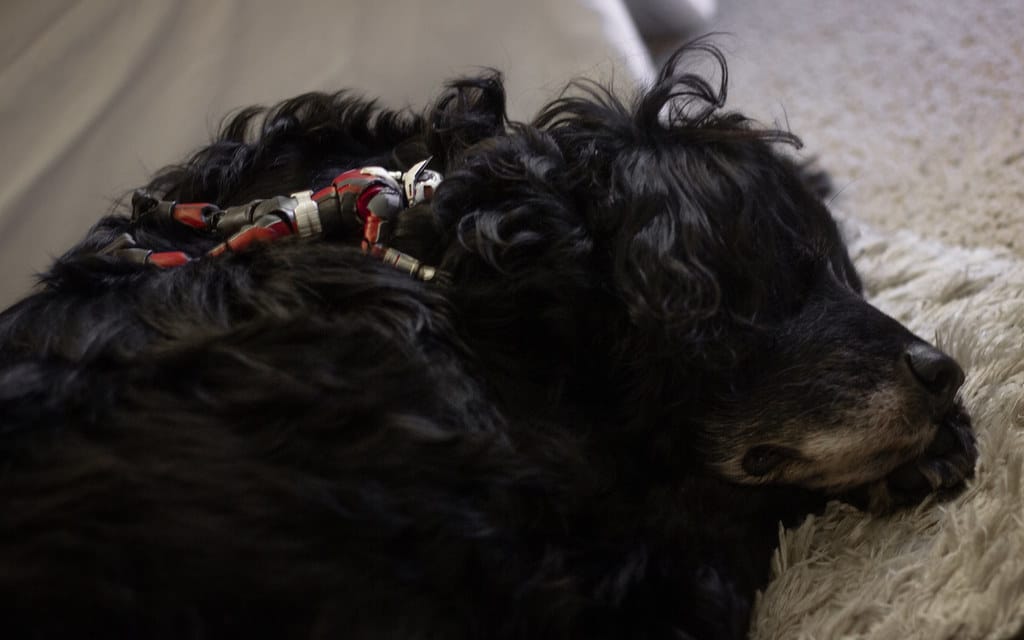Key Takeaways:
- Ants aren’t toxic to dogs per se
- Stinging ants could cause allergic reactions
- If your dog develops breathing problems after eating ants, you should call your veterinarian immediately.
To start with, your pooch has probably already eaten ants without your knowledge and was perfectly fine.
Occasionally, some ants will find their way into your pooch’s food bowl, and most pooches aren’t discerning about what they eat when kibble is right there.
In fact, ants are a great protein source and even have some vitamin C in there for good measure. The main point is that once your pooch is healthy and fed a balanced diet, then the occasional ant-based snack is perfectly safe.
How many ants are toxic to dogs?
Ants aren’t toxic to dogs per se. The main issue if your pooch eats ants is if they get bitten or stung. Ants release formic acid in their bites that some pooches can be allergic to and develop a reaction.
Ant stings contain venom, which is painful, and again, some pooches can be allergic to the venom and have nasty swelling or even breathing difficulties. Just a single ant could cause a problem for your pooch if they’re allergic, but this is luckily rare.
Ant stings and bites can cause allergic reactions in some pooches. Luckily, this is rare. If your pooch develops a reaction, the most common indication is swelling of the lips and face. Severe reactions can include breathing difficulties which is an emergency requiring veterinary intervention.
What to do if my dog ate ants?
If your dog has just eaten some ants and there are no indications of facial swelling, puffy eyes, or respiratory problems, then there’s nothing you need to do. Your dog will simply digest them and poop them out.
If, however, your pooch is showing signs of facial swelling or puffy eyes, panting, or any indication of respiratory distress, then you should contact your veterinarian immediately for an emergency appointment. Try to keep your dog calm and cool to minimize stress.
You don’t need to do anything if your fur baby eats ants unless they show signs of having been stung or bitten. Signs include a puffy face, swollen eyes, or breathing difficulties. If any of these occur, then you should contact your veterinarian for an emergency appointment.
When to see a vet?
For the majority of pooches that have an ant snack, you won’t need to see your DVM. Your dog will be well able to digest the ants with no ill effects. Even if some of the ants that your dog has eaten bite or sting your pup, the most likely outcome is minor irritation with little or no outward signs.
Rarely are some dogs allergic to ant bites or stings and have a reaction if the ant defends itself. Signs that your fur baby is allergic include respiratory difficulties such as breathlessness, panting, or even wheezing. In very rare, very severe cases, your dog could go into respiratory arrest, which could be fatal without immediate veterinary treatment.
You most likely don’t need to do anything if your pooch eats some ants unless they develop signs of respiratory distress or a swollen face.
What if my dog ate plenty of ants but seems fine?
The chances are that when your pup has eaten one ant, they’ve eaten a lot of ants and are unlikely to have any problems. If your furiend has guzzled down a whole swarm of ants, but they seem fine, then not to worry. Simply monitor your dog for a few hours for signs of facial swelling or breathing difficulties.
If your pooch seems fine after eating a lot of ants, then there’s nothing to worry about. Simply monitor them for a few hours for any adverse signs.
Signs that my dog got ant bites/stings
The primary signs that your pooch has been bitten or stung by ants that they’ve eaten include a swollen or puffy face and eyes. Signs of ant bites or stings can occur within minutes. Severe cases may have internal swelling of their throat, which may lead to respiratory distress. This is an emergency, and your veterinarian should be contacted immediately. Some dogs also have an inflamed esophagus which may lead them to have a reduced appetite for a few days.
Signs of ant stings and bites include a swollen face and possibly even respiratory distress. Respiratory distress is an emergency that requires immediate intervention.
How do vets treat ant stings/bites?
Depending on the severity of your dog’s signs, your veterinarian will treat respiratory distress with antihistamines and steroid medication.
In severe cases, your dog may require intubation (a tube in their airway) with oxygen to help them breathe. Your dog may require fluid therapy, but this is uncommon unless your dog is unable to eat due to swelling of their esophagus.
Final Woof
If your pooch eats ants, they’re unlikely to cause issues, and you shouldn’t worry. Just keep an eye on your dog for a few hours to watch for swelling and breathing difficulties.
If you notice any problems with your pooch’s breathing or any change in the color of their gums, then you should contact your veterinarian immediately for an emergency appointment to get treatment as early as possible.


